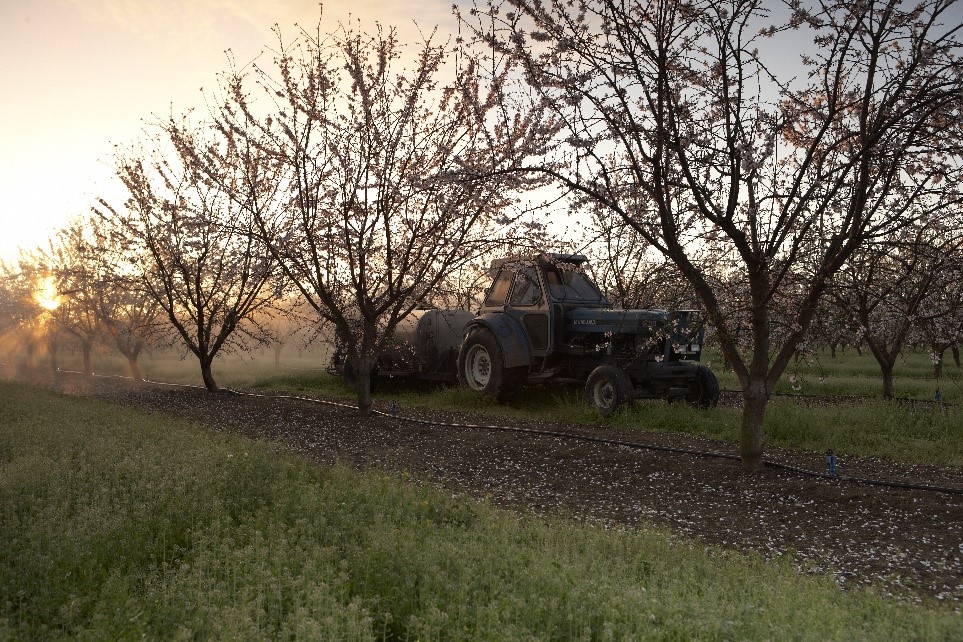Glyphosate — better known to many by its trade name, Roundup — is the most widely used herbicide on the planet, responsible for 20% of annual global herbicide use.1
 For almond growers, weed control is important for several reasons, including reducing competition with young trees, keeping micro-irrigation systems clear of weeds and maintaining a clean orchard floor during harvest.
For almond growers, weed control is important for several reasons, including reducing competition with young trees, keeping micro-irrigation systems clear of weeds and maintaining a clean orchard floor during harvest.
Despite its use on more than 100 crops in more than 130 countries for more than 40 years, glyphosate is increasingly under attack. Recent jury verdicts and regulatory actions consistently make headlines, leading consumers — and growers — to wonder what is going on.
The History Behind the Debate
The discussion around glyphosate began with an international body called the International Agency for Cancer Research (IARC), which rated glyphosate as a “probable human carcinogen” based on their 2015 review of the chemical compound. This categorization came as a surprise to all major regulatory agencies, including those in the US, European Union (EU), Canada, Japan and Australia. All agencies reviewed the data themselves and found the opposite to be true — that glyphosate is not carcinogenic when used as intended. In fact, in total, over 15 global risk assessment bodies have concluded that glyphosate is not a carcinogen. The outlier is IARC, whose conclusion automatically triggered lawmakers to add glyphosate to California’s Prop 65 list.
Despite this nearly unanimous opinion, the IARC assessment opened up a new front for those with concerns regarding GMO crops, as glyphosate use has been linked to these crops. Aided by new, easier residue testing methods, groups with these concerns have created headliner stories around glyphosate in relation to popular foods — albeit while these foods are meeting MRL standards — such as beer in Europe and cereal in the US. These stories put additional pressure on food manufacturers, among others involved in the food industry.
The IARC assessment also opened up Bayer, which recently acquired the producer of Roundup, Monsanto, to lawsuits claiming that exposure to glyphosate can cause cancer. As a result…
- Three cases have gone to trial in state and federal courts in California, with juries awarding extensive damages to plaintiffs who blamed glyphosate exposure for causing non-Hodgkin’s lymphoma, a form of cancer.
- In 2018, a jury awarded $289 million in damages (later reduced to $79 million) to Lee Johnson, a school groundskeeper from northern California. In March 2019, a federal court jury awarded $80 million to Edwin Hardeman, who also blamed Roundup for causing his cancer. A jury decision in a third case awarded over $2 billion to Alva and Alberta Pilliod, although this amount will likely be reduced on appeal.
Meanwhile, television advertising by law firms seeking potential plaintiffs for herbicide-related legal actions has become commonplace and the number of suits filed against Bayer are piling up.
What does this mean for almond growers?
Weed control is important to almond production for several reasons, including reducing competition with young trees, keeping micro-irrigation systems clear of weeds, reducing water use, and maintaining a clean orchard floor during harvest. Almond growers know glyphosate can be effective at weed control — recent data from the California Department of Pesticide Regulation suggests that most almond growers incorporate glyphosate into their weed control regimen.2 However, with documented growing resistance to glyphosate among some weeds, growers should continue to rotate herbicides and focus on resistance management.
Still, for the moment, there are no required changes in growers’ use of glyphosate in relation to weed management.
 In an official memo issued May 14, University of California President Janet Napolitano stated the decision to temporarily ban the use of glyphosate on ten UC campuses was based on health, environmental and legal concerns after a discussion with the UC Council of Chancellors. (Courtesy of YubaNet.com)
In an official memo issued May 14, University of California President Janet Napolitano stated the decision to temporarily ban the use of glyphosate on ten UC campuses was based on health, environmental and legal concerns after a discussion with the UC Council of Chancellors. (Courtesy of YubaNet.com)
Regardless of the scientific debate, there is growing concern around whether the herbicide will survive challenges in courts of law or the court of public opinion. In 2017, the EU cleared the chemical for use after the 2015 IARC report, but the decision wasn’t unanimous — nine of 28 countries at the time supported ending the use of glyphosate in the EU. Further, University of California (UC) President Janet Napolitano and Regents recently announced a temporary ban on the use of glyphosate on ten UC campuses, a decision heavily influenced by pressure from the student body.
“It’s not alarmist to say glyphosate is in trouble,” attorney Thomas Redick told Farm Journal last year. “The reality is that courts can carry the ball well into the end zone and award billions of dollars without seriously validated science. That’s the unfortunate situation that glyphosate appears to be in.”
The Almond Board will continue to carefully monitor developments that could affect the availability of this widely-used herbicide.
To learn more about controlling weeds in almonds, visit UC Davis’s guidelines for integrated weed management.
Published: May 17, 2019
[2] California Department of Pesticide Regulation use reports on almond acreage, 2011-2015, as documented in April 30, 2018 correspondence from the Almond Alliance of California to the U.S. Environmental Protection Agency Office of Pesticide Programs.